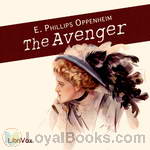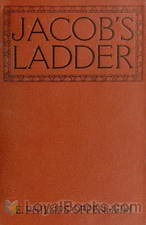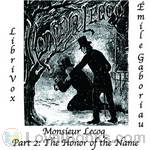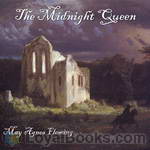|
Books Should Be Free Loyal Books Free Public Domain Audiobooks & eBook Downloads |
|
|
Books Should Be Free Loyal Books Free Public Domain Audiobooks & eBook Downloads |
|
Literature |
|---|
|
Book type:
Sort by:
View by:
|
By: Walter Pater (1839-1896) | |
|---|---|
 Marius the Epicurean
Marius the Epicurean
Marius the Epicurean is a philosophical novel written by Walter Pater, published in 1885. In it Pater displays, with fullness and elaboration, his ideal of the aesthetic life, his cult of beauty as opposed to bare asceticism, and his theory of the stimulating effect of the pursuit of beauty as an ideal of its own. The principles of what would be known as the Aesthetic movement were partly traceable to this book; and its impact was particularly felt on one of the movement’s leading proponents, Oscar Wilde, a former student of Pater at Oxford. | |
By: Edward Phillips Oppenheim (1866-1946) | |
|---|---|
 The Avenger
The Avenger
Herbert Wrayson, a bachelor returns to his flat one night to find a young lady rifling his desk. He questions her and finds she thought she was in the apartment of his neighbor, Morris Barnes, who lives above him. While he is on the telephone, she quietly slips out of his flat and heads to Barnes’ abode. A few hours later, she is once again at his door – this time looking scared and faint. She asks Wrayson to escort her downstairs as the hallway is unlit. As they emerge, a hansom sits at the doorway with Morris Barnes in it... | |
 The Pawns Count
The Pawns Count
"I am for England and England only," John Lutchester, the Englishman, asserted."I am for Japan and Japan only," Nikasti, the Jap, insisted."I am for Germany first and America afterwards," Oscar Fischer, the German-American pronounced."I am for America first, America only, America always," Pamela Van Tale, the American girl, declared.They were all right except the German-American.It is during World War I. A chemist, Sandy Graham, has discovered a new powerful explosive, but he let's it slip in a London restaurant that he has made the discovery... | |
 An Amiable Charlatan
An Amiable Charlatan
An Englishman is enjoying his dinner at Stephano's, at which he is a regular diner. A man enters quickly, sits at his table, starts eating his food, and hands him a packet underneath the table! So begins Paul Walmsley's acquaintance - and adventures - with American adventurer Joseph H. Parker and his lovely daughter, Eve. (Intro by TriciaG)Note that there is an alternate reading of section 8. Both are excellent renditions, so enjoy either or both of them. | |
 Great Secret
Great Secret
English gentleman Hardross Courage has a good life. He has all the money he needs, enjoys sports and hunting, manages the family estate, and in general leads a satisfying life. On a trip to London to participate in a cricket match, Hardross is confronted by a man who forces his way into his hotel room imploring him to hide him. His reason - “They want to kill me”. So begins a tale that is likely to change Hardross' idyllic life forever to one of mystery and espionage. | |
 Havoc
Havoc
Havoc occurs when European countries are discussing covert alliances. The story revolves around the creation of a secret alliance between Germany, Russia, and Austria. The English hope to split Russia away by holding the Czar to his previous public commitments, but they need proof of what was done to create the pressure. All the pressures that lead to WWI are there, but the intrigues and secret treaties create an interesting background to the twists and turns of the plot. | |
 Jacob's Ladder
Jacob's Ladder
| |
 Devil's Paw
Devil's Paw
A beautiful, intelligent young woman – is she a traitorous spy or a patriot? An aristocratic soldier permanently injured during the war – is he a patriot or is there more to him than meets the eye? A clandestine meeting on a beach – espionage or peace movement? | |
 Double Traitor
Double Traitor
The setting is the years prior to the outbreak of World War I. It is a time when Germany is outwardly preparing for war but Britain continues to believe it is invincible and that no one would challenge her. A vast German spy network flourishes in England, often in plain view. The main character is Francis Norgate, an aspiring British diplomat who falls in disfavor with his superiors for defending a woman while stationed in Berlin. The resulting scandal causes Norgate to be recalled. On the way home, he meets a German gentleman, Selingman, who claims to be a crockery salesman... | |
 Vanished Messenger
Vanished Messenger
A conference of European nations is being held in the Hague. England has not been invited to attend. Some think war is about to break out. Mr. John P. Dunster, an American, is traveling to the Hague with an important document that may prevent the outbreak of war when he mysteriously disappears after a train wreck in England. Richard Hamel is asked by the British government to attempt to solve the mystery of Dunster’s disappearance and prevent the outbreak of war in Europe. | |
By: Émile Gaboriau (1832-1873) | |
|---|---|
 Monsieur Lecoq Part 2: The Honor of the Name
Monsieur Lecoq Part 2: The Honor of the Name
Monsieur Lecoq is a captivating mystery, historical and love story: Around 11 o'clock, on the evening of Shrove Sunday 18.., close to the old Barrière d'Italie, frightful cries, coming from Mother Chupin's drinking-shop, are heard by a party of detectives led by Inspector Gévrol. The squad runs up to it. A triple murder has just been committed. The murderer is caught on the premises. Despite Gévrol's opinion that four scoundrels encountered each other in this vile den, that they began to quarrel, that one of them had a revolver and killed the others, Lecoq, a young police agent, suspects a great mystery... | |
By: Horatio Alger, Jr. (1832-1899) | |
|---|---|
 Timothy Crump's Ward
Timothy Crump's Ward
A poor family is surprised with an infant on their doorstep on New Year’s Eve with a note and monetary support requesting them to raise the child. Eight years later, the child is stolen and the family is put into more trouble trying to find her. This is a story of how love and good morals are reward with a fairy tale “happily ever after” ending. | |
 Grand'ther Baldwin's Thanksgiving, with Other Ballads and Poems
Grand'ther Baldwin's Thanksgiving, with Other Ballads and Poems
Horatio Alger, better known for his juvenile fiction, also penned some great poetry. His Ballads, including the 8 war poems and his odes, are collected in this volume. | |
By: David Lindsay (1876-1945) | |
|---|---|
 A Voyage to Arcturus
A Voyage to Arcturus
A Voyage to Arcturus is a novel by Scottish writer David Lindsay, first published in 1920. It combines fantasy, philosophy, and science fiction in an exploration of the nature of good and evil and their relationship with existence. It has been described by critic and philosopher Colin Wilson as the "greatest novel of the twentieth century" and was a central influence on C. S. Lewis's Space Trilogy. | |
By: Mary Webb (1881-1927) | |
|---|---|
 Gone To Earth
Gone To Earth
“Gone to Earth” is the cry of fox hunters as the fox takes to its den and they lose the chase. Here, Mary Webb tells the story of Hazel Woodus whose understanding of her half tame fox cub contrasts with her misunderstanding of humanity. She is pursued by two very different men, a Gentleman Farmer and the local Minister. Mary Webb’s writing is sometimes compared to that of Thomas Hardy, her descriptions of nature are vivid and her view of love and life is touched with tragedy. She wrote this book in 1917 and it is set in the borderlands of rural Shropshire. | |
By: Théophile Gautier (1811-1872) | |
|---|---|
 Clarimonde
Clarimonde
Original title “La Morte Amoreuse.” This is the story of a priest named Romauld, and his all-consuming love for the beautiful courtesan, Clarimonde. | |
 Romance of a Mummy and Egypt
Romance of a Mummy and Egypt
MANUAL OF SURGERY, OXFORD MEDICAL PUBLICATIONSBY ALEXIS THOMSON, F.R.C.S.Ed.PREFACE TO SIXTH EDITION Much has happened since this Manual was last revised, and many surgical lessons have been learned in the hard school of war. Some may yet have to be unlearned, and others have but little bearing on the problems presented to the civilian surgeon. Save in its broadest principles, the surgery of warfare is a thing apart from the general surgery of civil life, and the exhaustive literature now available on every aspect of it makes it unnecessary that it should receive detailed consideration in a manual for students... | |
By: Susan Warner (1819-1885) | |
|---|---|
 The Wide, Wide World
The Wide, Wide World
“How should a seven year old child react when forced to be separated from a mother who meant everything to her? How should she react when she learns that the aunt with whom she was sent to live doesn’t really care about her? Will she be able to make real friendships with people outside her family? Would she be able to take her belief in God as a comfort? If you want to find answers to all these questions, read the enjoyable novel “The Wide, Wide World”. There, you will see how the amazing Ellen Montgomery reacts to all those things, and many, many more”. | |
 Nobody
Nobody
There are many romantic tales about a handsome and rich man falling in love with a beautiful lower class woman over the objections of his family. Remember Elizabeth Bennett and Fitzwilliam Darcy? however, it takes more than a good woman to secure a man's happiness. He has to have mental strength. It is not certain that our hero, Tom, has that. Lois is a great woman. However, according to his sister, she is a "nobody." Does money and position control everything? Certainly not. Good people deserve to be happy... | |
By: Earle Ashley Walcott (1859-1931) | |
|---|---|
 Blindfolded
Blindfolded
Giles Dudley is called upon by his cousin Henry Wilton to assist him in San Francisco, but the reason for the summons is not at all clear. Dudley answers the summons, only to find himself immediately wrapped in the middle of mystery and intrigue, the roots and ends of which he is utterly unaware. He has been given to care for a mysterious young boy whom he hasn't even seen. His cousin has mysteriously disappeared. Dudley's role in the mystery has him convinced that as he goes about trying to assist his cousin with whatever it was he wanted to accomplish, he does so completely blindfolded. | |
By: Thornton W. Burgess (1874-1965) | |
|---|---|
 Old Granny Fox
Old Granny Fox
Old Granny Fox and grandson Reddy Fox must use all their cunning to hunt up enough food to survive the long winter. Food in the Green Meadow is scarce but Farmer Brown's hens are locked up tight and protected by Bowser the Hound, so Granny takes a conceited Reddy hunting and teaches him some surprising new tricks to lure in their dinner. Old Granny and Reddy Fox encounter danger and adventure in their quests to keep their bellies full, including a close encounter with Farmer Brown's boy, a clever plot to steal Bowser's food, and an unforeseen thief who might outsmart this sneaky pair. | |
 Blacky the Crow
Blacky the Crow
Blacky the Crow is a clever rascal who lives in the Green Forest and Meadow. He loves to play tricks on the other little people who are his neighbours, and is curious about Farmer Brown’s Boy. Blacky is always thinking about what is right and what is wrong, but he still gets into all kinds of mischief. | |
By: Isabella Matilda Davis Brittingham (1852-1924) | |
|---|---|
 The Revelation of Baha-ullah in a Sequence of Four Lessons
The Revelation of Baha-ullah in a Sequence of Four Lessons
Isabella Matilda Davis Brittingham was a significant early American Bahá’í and was posthumously designated by Shoghi Effendi as one of the 19 Disciples of ‘Abdu’l-Bahá and Heralds of the Covenant. She was born in 1852, the daughter of Benjamin Davis, who was a grandson of John Morton, a signer of the Declaration of Independence. Her sister-in-law heard about the Bahá’í Faith in 1897 and in 1898 Isabella herself became a part of the nascent American Bahá’í community. In September 1901, Isabella went on pilgrimage to the Holy Land, where she met ‘Abdu’l-Bahá, the leader of the Bahá’í Faith and son of the Founder, Bahá’u'lláh... | |
By: Mrs Charles Bryce (1839-1920) | |
|---|---|
 The Ashiel Mystery - A Detective Story
The Ashiel Mystery - A Detective Story
Just as the adopted Juliet Byrne finds out the truth about her family, her father is murdered. Luckily the brilliant chocolate-munching Detective Gimblet takes up the case to solve the 'Ashiel Mystery' | |
By: Robert Gordon Anderson | |
|---|---|
 Seven O'Clock Stories
Seven O'Clock Stories
“Not once upon a time but just now, in a white house by the side of a road, live three happy children.Their mother and father gave them very odd names, for two old uncles and one aunt, which pleased the old people very much. Their names are all written in the big family Bible,–Jehosophat Green, Marmaduke Green, and Hepzebiah Green.” So begins this collection of bedtime stories for children, one each night for twenty days, involving these three happy children and their playmates. | |
By: William J. Burns (1861-1932) | |
|---|---|
 The Crevice
The Crevice
The sudden death of wealthy and prominent financier, Pennington Lawton from an apparent heart attack, followed by the shocking revelation of his impending bankruptcy, leaves his sole heir and only daughter, Anita, distraught and nearly penniless. Nonetheless, she is determined to unravel the mystery surrounding her father’s death and the loss of his great fortune. To this end she engages the famous detective, Henry Blaine who is determined to unravel the tangled web of deception and restore both her father’s reputation and Anita’s inheritance... | |
By: May Agnes Fleming (1840-1880) | |
|---|---|
 The Midnight Queen
The Midnight Queen
May Agnes Fleming is renowned as Canada's first best-selling novelist. She wrote 42 novels, many of which have only been published posthumely.The Midnight Queen is set in London, in the year of the plague 1665. Sir Norman Kingsley visits the soothsayer "La Masque" who shows him the vision of a beautiful young lady. Falling madly in love with her, he is astonished to find her only a short time later and saves her from being buried alive. He takes her home to care for her, but while he fetches a doctor, she disappears. Sir Kingsley and his friend Ormistan embark on an adventure to solve the mystery of the young lady - will they ever find her again? | |
By: F. Anstey (1856-1934) | |
|---|---|
 The Brass Bottle
The Brass Bottle
What happens when a not-so-lucky man happens upon a brass bottle and releases the djinni caught within? Misunderstanding, culture shock, hilarity, among other things. Will the well-intentioned djinni help his new master? Or will he make things even worse? | |
 Vice Versa
Vice Versa
Set in Victorian times, the novel concerns business man Paul Bultitude and his son Dick. Dick is about to leave home for a boarding school which is ruled by the cane wielding headmaster Dr. Grimstone. Bultitude, seeing his son's fear of going to the school, foolishly says that schooldays are the best years of a boy's life, and how he wished that he was the one so doing. At this point, thanks to a handy magic stone brought by an uncle from India which grants the possessor one wish, they are now on even terms... | |
 Baboo Jabberjee, B.A.
Baboo Jabberjee, B.A.
Another delightful example of an English writer poking fun at his countrymen, or maybe all races' reactions to someone from a diferent background. A series of adventures of a well educated foreigner in London which originally appeared weekly in Punch, sometimes with illustrations, dealing with the difficulties of fully understanding a different culture. The hero's perfect English reminds one of a quote from "My Fair Lady" ..."His English is too good, he said, "that clearly indicates that he is Foreign. Whereas other people are instructed in their native language English people aren't." | |
 Talking Horse And Other Stories
Talking Horse And Other Stories
A collection of short stories by famed humorist and Punch magazine staff member, F. Anstey, pseudonym for Thomas Anstey Guthrie. They range from humorous and whimsical to haunting and thought-provoking. | |
 Tinted Venus
Tinted Venus
When a young newly engaged man finds himself bound for an amusement garden with an old flame, not his fiancee, it is not surprising that he still feels some attraction for her. When they escape the heat of the dance floor to walk among the trees in the garden, it is not surprising that they should come upon a statue of a woman of uncommon beauty, with the smallest hands. When the young man attempts to demonstrate that his absent fiancee has hands even smaller than this immortalized stone woman, it is surprising when the engagement ring he is carrying fits easily on the stone finger, but does not easily come off... | |